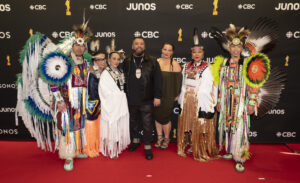Traditional Indigenous music encompasses the many unique vocal styles, instruments, and songs created by artists and groups from Indigenous Nations across Canada. Each song has different origins, teachings, purposes, and is rooted in Indigenous people’s spiritual, mental, physical, and emotional connections to the land and cultures they belong to.
When the JUNO award for Indigenous Artist or Group of the Year was created in 1994, it was always the intention of CARAS to create a second category that focused exclusively on celebrating traditional Indigenous music. This past year that goal was finally realized when the Indigenous Artist or Group of the Year category was split into two separate categories – contemporary and traditional.

Fawn Wood, winner, Traditional Indigenous Artist of Group of the Year. JUNO Opening Night Awards. Toronto, On. May 14, 2022. Photo: iPhoto/CARAS
Unlike the original award category which honoured both contemporary and traditional artists, Traditional Indigenous Artist or Group of the Year aims to provide space and opportunities for Indigenous artists and groups who have historically been underrepresented within the preexisting category’s nominees and winners. With the introduction of this new award, the JUNOS will promote and help preserve traditional styles of music such as pow wow songs, round dance songs, hand drum songs, and many more.
“I think it’s a blessing and it was something that was a long time coming,” the inaugural Traditional Indigenous Artist or Group of the Year award winner Fawn Wood told Windspeaker.com. “At one time it was illegal to sing our music. But this is the music that has been on this land forever.”
But not all music that has emerged from Indigenous communities is traditional. For years, artists such as a Buffy Sainte-Marie, Snotty Nose Rez Kids, and Halluci Nation (formerly known as A Tribe Called Red) have been fusing together the contemporary and traditional by incorporating Indigenous narratives, instruments, and singing styles into various genres. The Contemporary Indigenous Artist or Group of the Year category now exists to celebrate musical contributions such as these by recognizing the work of Indigenous musicians in any genre.

DJ Shub. JUNO Award Broadcast. Budweiser Stage, Toronto, On. May 15, 2022. Photo: iPhoto/CARAS
“I think it’s amazing,” said the 2022 Contemporary Indigenous Album of the Year award winner DJ Shub whose music blends together powwow, electronic, and hip hop. “I think that breaking it up like this really helps individual artists who are mixing that contemporary with the traditional. I think this category is just going to open up a floodgate of all the amazing artists who are out there.”
With the introduction of the second Indigenous music category, the JUNO Awards are also able to honour and showcase more Indigenous artists while broadening the reach and understanding of Indigenous music and culture in Canada. “The more awards and the more spotlight on Indigenous artists, the better,” first-time JUNO nominee and singer-songwriter Jayli Wolf told CBC.
Submissions for the 2023 JUNO Awards Presented TD are now open until Friday, October 28th at 11:59PM ET. For more information visit junosubmissions.ca.
Featured image: Snotty Nose Rez Kids with Fawn Wood. JUNO Opening Night Awards. Metro Toronto Convention Centre, Toronto, On. May 14, 2022. Photo: iPhoto/CARAS